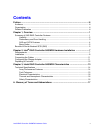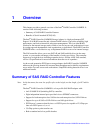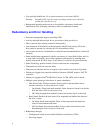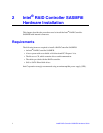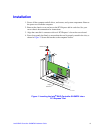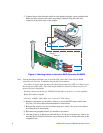3 Intel® RAID Controller SASMF8I Hardware Guide
• User specified rebuild rate (% of system resources to use from 0-100%).
Warning: Exceeding 50% rate may cause operating system errors caused by
waiting for controller access.
• Background operating mode can be set for rebuilds, consistency checks,and
initialization (auto restarting consistency check on redundant volumes).
Redundancy and Error Handling
• Enclosure management support, including LEDs.
• Activity and fault indicators per drive, port selector (dual-port drives).
• Drive coercion (auto resizing to match existing disks).
• Auto-detection of failed drives with transparent rebuild. Disk activity (I/O to the
drive) must be present for a missing drive to be marked as failed.
• Auto-resume on reboot of initialization or rebuild (must be enabled before virtual disk
creation).
• Smart initialization automatically checks consistency of virtual disks if there are five
or more disks in a RAID 5 array which optimizes performance by enabling read-
modify-write mode. RAID 5 arrays of only three or overdrives use peer read mode.
• Smart Technology predicts failures of drives and electronic components.
• Commands are retried at least four times.
• Firmware provides best effort to recognize an error and recover from it if possible.
• Failures are logged from controller and drive firmware, SMART monitor, SAF-TE
controller.
• Failures are logged in Intel
®
RAID Web Console 2; CIM, LEDs, and via alarm.
• Multiple cache options provide choice of speed, redundancy:
— Disk Write Cache: The data written / (done) signal is returned when data is
written to the drive or only to the drive’s cache.
^ On (default): Write back mode enabled. Faster, because it doesn't wait for the
disk, but data will be lost if power is lost.
^ Off: Write-through mode enabled. Slower, but ensures data is on the disk.
— Read Ahead: Predicts the next read will be sequential and buffers this data into
the drive’s cache.
^ On: Read Ahead mode enabled. Faster in data sequential read mode but
slower in data random read mode.
^ Off: Non-Read Ahead mode enabled. Always reads from the drive after
determining the exact location of each read.
• Redundancy through:
— Configuration stored in nonvolatile RAM and on the drives (COD).
— Hot swap support.




